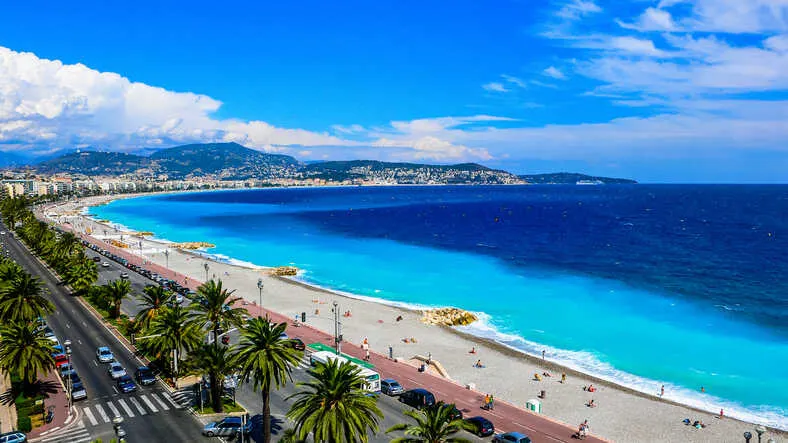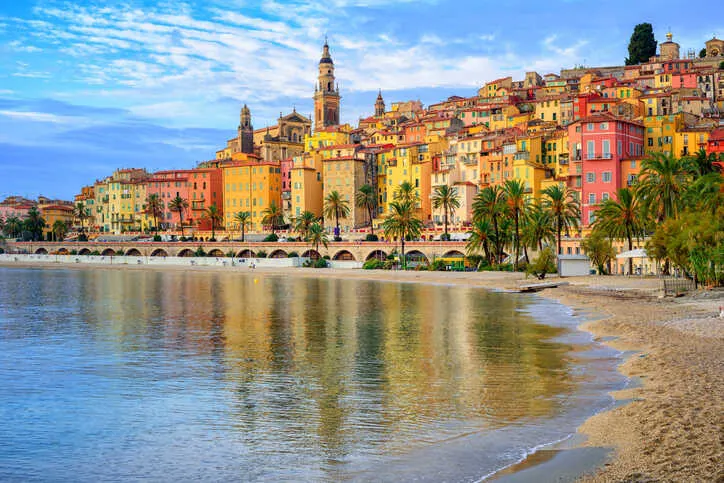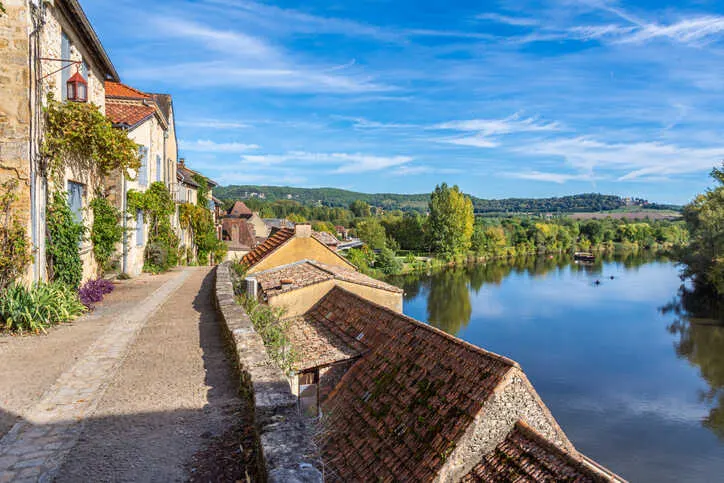If you’re looking for an easy-living lifestyle—rich in cultural diversions and gourmet delights—look no further than La Belle France. As the most visited country in the world, it’s no wonder that more and more people are choosing to call the romantic land of rolling vineyards and elegant, café-lined boulevards home. With the possibility to purchase a lost-in-time stone house in Burgundy or Bordeaux, a cozy chalet in the Savoie mountains, or a modern apartment along the French Riviera in Nice, expats and retirees are spoiled for choice.
While you might think that this fine-living lifestyle comes with a hefty price tag, that is surprisingly not the case. Housing costs are, on average, 34% less than in the United States, with monthly rents currently averaging a whopping 49.8% less than in the U.S. (source: numbeo.com).
There’s no better time to make the move to this beautiful corner of Europe.
Get Your Free France Report Here
Get Your Free France Report Here
Learn more about the efficiency and cost-effectiveness of healthcare in France and other countries in our daily postcard e-letter. Simply enter your email address below and we’ll send you a FREE REPORT: A Taste of France: All the Ingredients for the Good Life.

By submitting your email address, you will receive a free subscription to IL Postcards and special offers from International Living and our affiliates. You can unsubscribe at any time, and we encourage you to read more about our Privacy Policy.
Why Move to France

Besides the lower housing costs, France is an undeniably beautiful and culturally diverse country. Sharing borders with eight European neighbors, each region brings its own distinct flare and gourmet touch. Fans of Italy will love the live-out-loud style of cities like Nice and Menton, while the Grand East region of Alsace will entice others with its fairytale, half-timbered villages and the chance to hop across the border for a few German lagers.
France is an especially attractive spot for retirees—both for quality of life and long-term planning.
Healthcare costs are also significantly lower than back home. France has a universal healthcare system, which allows anyone to adhere—with no limitations on age, pre-existing conditions, or income requirements. Ranked as one of the top healthcare systems in the world, if you’re looking for high-quality care at reduced prices in retirement, France is the place to be.
Steps Moving to France

Many successful expats who made the transition to France started with a vague idea of where they wanted to land and gradually progressed to a clear set of expectations. Investing a bit of time in research, gathering the necessary documents, and understanding the visa process are some of the first steps to moving to France and making your dream of living in Europe come true.
Research
The best way to start narrowing down where you’d like to live is to make a list of “must-haves.” Are you looking for a place with mild winters and warm summers, or is weather not a factor? Would you like to leave big-city living behind and slide into a charming French village, or are you looking for the diversions of a chic, urban locale? Starting with your ideal “wish list” is a great way to help solidify your criteria.
After you’ve selected a few of your favorite spots in France, consider planning a scouting trip. You can contact expat groups along your itinerary to arrange coffee meetings or lunch dates. There’s no better resource than boots-on-the-ground information. Expats “in the know” will give you the real deal, warts and all, on life in their corner of France.
Prepare Documents
The bulk of the documents you’ll have to gather will be concentrated on the visa process. You’ll need items like a passport and proof of financial means (which is equivalent to the French minimum wage), proof of three months of accommodation, and visa-specific health insurance (which covers France and the Schengen Zone).
Visa Application
Applying for a French visa takes place in your country of residence, notably the US or Canada for purposes of this article. The application is no longer managed at the French consulate and has been outsourced to a third-party processing center called VFS. VFS has centers in major cities throughout the United States and Canada, which are listed on their website: www.vfsglobal.com.
The first step is to decide which visa will fit your needs. For most people, this will be a Long-Stay Visa, which allows the holder to reside in France for 12 months. There is no specific retirement visa, so if you plan to make France your permanent home, this is the correct visa to obtain.
Near the 12-month mark, you will renew your Long-Stay Visa in France. After four years of consecutive renewal (five years total residency in France), you can apply for a 10-year residency or French citizenship.
The Long-Stay Visa is not to be confused with the Long-Stay Visa—Titre de Séjour (VLS-TS), which is designed for students or temporary workers who can stay up to 12 months in France.
It’s important to note that you cannot work for a company or seek employment in France on a Long-Stay Visa. If you wish to work in France, you can apply for one of the special qualifications under the Talent Visa designation, including highly skilled workers, artists, or individuals of international renown. Although an option, these types of visas are quite difficult to obtain, as unemployment in France is historically high and individuals are rarely granted a visa if it’s determined that a French national could fill the role.
Lastly, entrepreneurs can look at the Profession Libérale designation. Applicants need to prove €30,000 of investment in an existing business, provide a business plan, and have a master’s degree or equivalent experience in their field. To learn more, please visit the France-Visas website: www.france-visas.gouv.fr.
Language Barriers
Learning French doesn’t need to be a barrier to living your dream life abroad. Although no one would argue that French is the easiest language to learn, the good news is that you’ll pick it up very quickly once you arrive. You also don’t need to be fluent in the language, or even have an advanced level, before making the move.
Of course, learning a bit of the language is always helpful before you move to another country. You’ll be pleasantly surprised at how many French people are willing to help you when they see your efforts to speak their language—which they know is quite a big challenge.
If you’re still nervous about diving in, choose a city in France where English is quite widely spoken. Anywhere along the coastline in southeastern France (like Nice, Cannes, or Antibes) or larger cities like Paris and Strasbourg are well-used to conversing with English-speaking residents.
In the end, French is a beautiful and captivating language. You may just find yourself falling in love with the language of romance.
Finances/Cost of Living
The cost of living in France will vary greatly depending on the cost of housing in your chosen region. You can live very well on $2800 a month in places like the Dordogne, Limoges, Brittany, Alsace, parts of Occitanie, and several other countryside areas around France. As your principal savings will come from lowered housing costs, these are some of France's most affordable rental and homebuying markets.
If you’d like to live in a popular French city like Lyon, Bordeaux, or Nice, you'll need to contribute 20% or more to housing, putting your starting budget at $3200 a month or more.
Of course, Paris will be the most expensive city for housing. Although, if size is not a factor, you can still get a small pied à terre for a reasonable price in the City of Light—when measured with comparable cities in the U.S.
Property taxes are about a 10th of what we pay in the United States, and another big break will come from healthcare. As the system is run by the government, and fees are regulated across the board, medical costs are incredibly cheap. Doctors’ visits come in at $9, and specialists run about $18 a visit. As the French cannot use any passive income (Social Security payments or pensions) to calculate healthcare fees—thanks to a tax treaty with the United States—the average yearly fees for retirees are quite low. Many pay around $2300 - $2700 a year to access French healthcare, which is a sizable savings when compared to the US.
Housing/Rentals/Accommodation
As mentioned, housing prices can vary widely across France, so it’s a good idea to target your desired areas budget-wise before considering places to rent.
Some people choose to purchase property before making the move to France. Of course, this is an individual decision based on personal circumstances, but if possible, securing a short-term rental is a good idea before jumping into the buying process. You may spend three months in a cozy French village to find out you’re better suited to another charming French hamlet just down the road. Or you may like where you’ve landed but realize there’s an even better neighborhood, full of bistros and wine shops, on the other side of town.
As you only need to prove three months of accommodation in order to apply for the Long-Stay Visa, finding a short-term rental lessens a lot of potential moving stress. You can find short-term rentals in France on sites like Morning Croissant: www.morningcroissant.com.
After you’ve gotten your feet wet, if you’d like to find a long-term rental, you can either work with a French agency or look for rentals on sites like Le Bon Coin. You will need to get together what’s called a “dossier”—basically an application proving your long-term financial stability —and submit it to the landlord for approval.
If you’d like to purchase property, it’s a good idea to work with an English-speaking real estate agent who can guide you through the process. You can contact local expat groups for recommendations, or if your French is strong enough, tackle the process yourself. The good news is that buying a house in France is not difficult. Diagnostics are provided by the owner, and both purchaser and seller use a notary public to ensure the sale proceeds smoothly.
Working in France

The easiest way to work in France is to be transferred to an American branch of a company where you are already employed. Having a French company sponsor you for a working visa is, unfortunately, nearly impossible. Like other European countries, France has strict labor laws protecting its citizens. As stated previously, unemployment is quite high, so an open position will always go to a French national or EU passport holder.
If you’d like to try an alternative route, applying for the Profession Libérale or Talent Visa could be an option. The French enjoy excellent working conditions, with five weeks of paid vacation a year and company perks like stipends for meals out.
Healthcare
France is often cited as one of the top healthcare systems in the world. The service is open to everyone, regardless of age, income, or pre-existing conditions. There are no networks to join, and you can see any doctor or specialist around the country. The online booking system, Doctolib, has made finding a doctor even easier for expats. You can book an appointment with a general practitioner, specialist, dentist, physical therapist, or even an MRI exam directly online.
To qualify for French healthcare, you will need a Long-Stay Visa and can apply after three months of living in a country.
Once in the system, you are entitled to a 70% to 80% reimbursement on medical costs and up to 100% off prescription drugs.
Please see our Healthcare in France for more detailed information and approximate annual costs.
Safety
France is a very safe and secure place to live. Since there is no right to bear arms, violent crime is very low. Like anywhere else in the world, it is a good idea to always be aware of your surroundings, and residents should pay attention to their belongings on public transportation.
Petty crime, vandalism, and graffiti are common in certain parts of the country, often concentrated in larger cities. Although crime is statistically very low, home break-ins are prevalent in areas like the south of France, where people often leave on vacation. It’s a good idea to invest in an alarm system if you plan to be away from home often.
Moving Your Pets to France
If you plan to move with your dog, cat, or bird to France, there are a few simple guidelines that you will need to follow. Your pet must be at least 12 weeks old and must be identified by a microchip or a tattoo. In the case of a tattoo, it must have been applied before July 2011.
The animal must also have a valid rabies vaccination. A period of 21 days must pass between the last shot and the day of your departure if this is the first rabies vaccination for your animal.
Your veterinarian will need to sign off on a health certificate, which is endorsed by the USDA. The certificate is valid for 10 days. If your pet meets all these requirements, France has no quarantine period.
Get Your Free France Report Here
Get Your Free France Report Here
Learn more about the efficiency and cost-effectiveness of healthcare in France and other countries in our daily postcard e-letter. Simply enter your email address below and we’ll send you a FREE REPORT: A Taste of France: All the Ingredients for the Good Life.

By submitting your email address, you will receive a free subscription to IL Postcards and special offers from International Living and our affiliates. You can unsubscribe at any time, and we encourage you to read more about our Privacy Policy.
Expat Locations in France

There are as many different regions in France as there are tastes and budget needs. As mentioned at the start of the article, it’s best to create a “must-have” list and start to narrow down your possibilities. We’ll look at a sampling of places around the country that combine attractive lifestyles, solid expat communities, and beautiful geographical features.
Nice, on the French Riviera, is often cited as the top place for expats to live in France. The city has an airport within its limits, with low-cost flights to other destinations in Europe and a few direct flights to the United States. Additionally, there is a very large international community, with a wealth of social and cultural activities. You also won’t need to purchase a car in Nice. The transportation system is excellent, and you can walk most of the historic center and along the pretty Promenade des Anglais.
If you’d like to take advantage of the lovely weather in the south of France on a slimmer budget, head to the interior region of Provence known as Provence Verte—Green Provence. Here, you’ll find wildly charming French villages and rolling vineyards as far as the eye can see. Activities include visiting the local lakes, hiking along the rivers and waterfalls, and visiting many of the gourmet restaurants scattered across the region. Villages to consider with existing expat groups include , Lorgues, and Aups.
The gastronomic capital of France is also an incredibly exciting place to live. At the intersection of two rivers, the Saone and the Rhône, Lyon is not only a food lover’s paradise but also combines theater venues, opera, and the arts with an easy transition to French life. This city is very walkable and has an active and helpful expat group called The American Club of Lyon.
Lastly, for the most affordable place on the list, have a look at the Dordogne in southwestern France. The region, known for having 1,001 chateaux (castles), has been a favorite among English expats for generations. Not only will you enjoy beautiful French countryside living, but you’ll also have access to services in English and a thriving expat community.
What I Wish I’d Known Before Moving to France
The most important thing I wish I’d known before moving to France is the importance of keeping an open mind. While getting all the paperwork together is a bit of a headache, my real stress came from worrying about learning French and getting to know the French people.
Where I thought I would find disdain for Americans, perhaps even rudeness, I found a kind and generous group of new friends who were more than willing to help me as I fumbled through their language.
Secondly, all the small details I’d worried about—like setting up a bank account, securing healthcare, and buying a car—all fell into place with a little trial and error. While the “set up” phase can sometimes make you feel quite anxious, it’s a small price to pay for the wonderful lifestyle that awaits you in France.
Final Word on Moving to France
As a land of exceptional beauty, gourmet delights, and top-notch healthcare, France is an amazing country with something to offer for every taste and budget. From the bustling seaside of the French Riviera to the hay-stacked countryside of the Dordogne, expats are spoilt for choice in the variety of landscapes and cultural diversions. With a little time invested and a willingness to test-drive potential locations, France can be an ideal place to live, retire, or invest.
Get Your Free France Report Here
Get Your Free France Report Here
Learn more about the efficiency and cost-effectiveness of healthcare in France and other countries in our daily postcard e-letter. Simply enter your email address below and we’ll send you a FREE REPORT: A Taste of France: All the Ingredients for the Good Life.

By submitting your email address, you will receive a free subscription to IL Postcards and special offers from International Living and our affiliates. You can unsubscribe at any time, and we encourage you to read more about our Privacy Policy.















